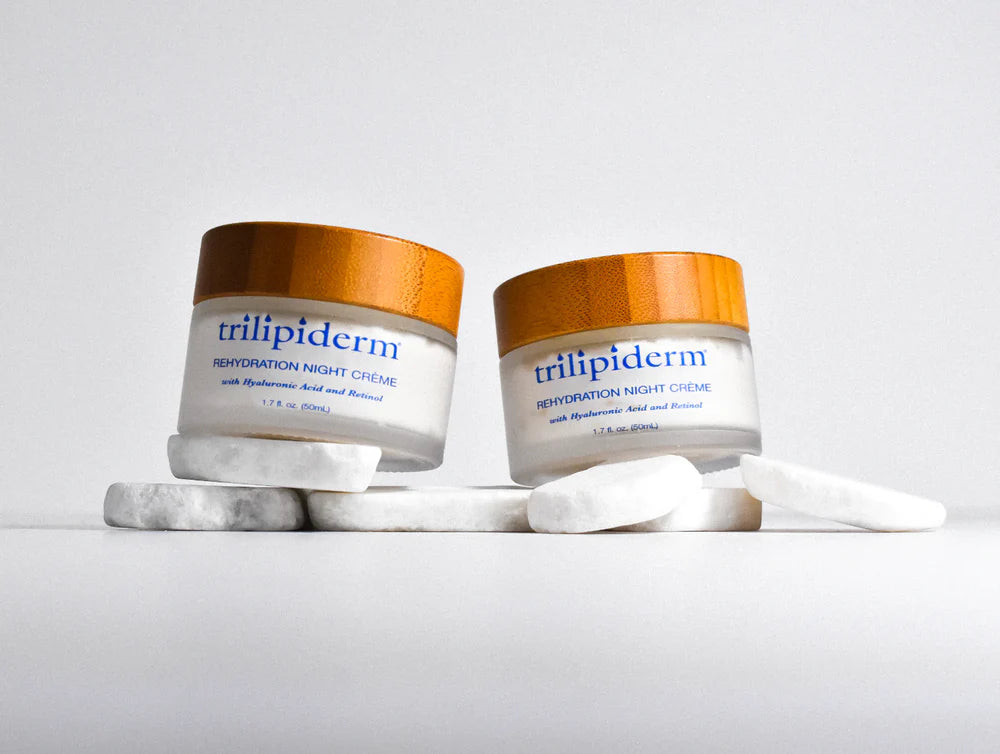Have you ever wondered, "Is vitamin D good for skin?" If so, you're in the right place. Today, we're diving deep into how vitamin D can impact your skin health. Many ask if it's safe to apply vitamin D directly on the face or if taking it daily has any downsides. Questions about whether vitamin D can brighten your skin or if there are side effects also pop up frequently. In this blog, we'll tackle these queries head-on.
We'll explore how vitamin D aids in skin repair and protects against damage, how it influences the growth of skin cells, and its role in maintaining a robust skin barrier. Plus, we'll discuss our Trilipiderm products, like the All-Body Moisture Retention Crème Broad Spectrum SPF 30 with Vitamin D and the Protective Day Crème Broad Spectrum SPF 30.
These SPF skin moisturizers are crafted to integrate the benefits of vitamin D into your daily skincare routine, offering you a pathway to a healthier, more resilient complexion. Stay tuned to learn why Trilipiderm might just be your top choice for skin health.
What Is Vitamin D?
Is vitamin D good for the skin? Well, Vitamin D is a fat-soluble vitamin essential for maintaining the health of bones and teeth. It plays a critical role in the absorption of calcium and phosphorus from our diet. This nutrient is unique because your body can produce it when your skin is exposed to sunlight. Specifically, UVB rays from the sun help convert cholesterol in the skin into vitamin D.
Applying Vitamin D to Your Skin
Vitamin D is also found in various skincare products. It's often added to creams and lotions designed to enhance skin health. When included in creams, vitamin D can be applied directly to the skin, offering a targeted approach to benefit from its properties.
This vitamin is not just limited to sun exposure; it's also available in dietary supplements. You can find vitamin D in two forms: D2 (ergocalciferol), which comes from plant sources, and D3 (cholecalciferol), which is derived from animal sources or can be synthesized when the skin is exposed to sunlight. Both forms are commonly available as pills or capsules, allowing for easy daily intake, especially in regions with limited sunlight.
Whether through direct sunlight, dietary supplements, or infused skincare products, vitamin D remains a crucial element for health, impacting not only our bones but also our skin. This adaptability makes it an invaluable addition to both healthcare and skincare routines.
Is Vitamin D Good for Skin?
Let's cut straight to the chase: Is vitamin D good for your skin? There's quite a bit to unpack here, so let's dive into the scientific facts and understand exactly how vitamin D interacts with our skin.
Enhances Skin Repair and Cell Growth
Vitamin D plays a vital role in skin health by contributing to skin repair and cell growth. Research shows that it helps activate the skin's immune system and repair mechanisms. This can be crucial for healing wounds and preventing skin infections. Cells in the skin can convert vitamin D to its active form, which then helps to regulate the growth and differentiation of skin cells.
Potential in Protecting Against Skin Damage
Vitamin D has been observed to possibly offer protection against damage from low levels of radiation and reduce the risk of skin cancer. Its role in modulating anti-inflammatory processes and cellular growth might be mechanisms through which it provides its protective effects.
Impact on Skin Tone and Health
While vitamin D itself does not lighten skin, its deficiency can cause skin to appear dull and more prone to aging. By promoting skin cell metabolism and growth, adequate vitamin D levels can help maintain skin vitality and appearance.
Might Reduce Symptoms of Skin Conditions
There is evidence suggesting that vitamin D can reduce symptoms in certain skin conditions like psoriasis. Vitamin D analogs—compounds similar to vitamin D—are often used in topical treatments for psoriasis. They aid in slowing down the production of skin cells, which helps reduce the scaling and inflammatory responses seen in this condition.
Overall, vitamin D does bring several benefits to skin health, notably in skin repair and potentially reducing symptoms of inflammatory skin conditions. It also plays a protective role against certain types of skin damage. However, like any nutrient, balance is key.
Using Vitamin D on Your Skin
Let's get straight to the point: How do you use Vitamin D products on your skin effectively? Here's a straightforward guide to incorporating Vitamin D into your skincare routine safely and effectively.
Choose the Right Formulation
Start by selecting a skincare product that contains Vitamin D. Look for serums, creams, or lotions that list Vitamin D3 (cholecalciferol) as an active ingredient. This form is closest to the natural Vitamin D produced by your body.
Apply to Clean Skin
For best results, apply Vitamin D products to clean skin. Use them after cleansing but before applying heavier creams or oils. This ensures that Vitamin D penetrates the skin more effectively.
Use Appropriate Amounts
Is vitamin D good for the skin? Yes! And a small amount usually suffices. About a pea-sized dollop of cream or a few drops of serum should cover the face and neck. Overusing can lead to product wastage without providing additional benefits.
Integrate into Morning or Night Routine
You can use Vitamin D products either in the morning or at night. If your product contains SPF, apply it in the morning to protect against sunlight. If it's simply a nourishing cream or serum, it can be used at night to support skin repair during sleep.
What Not to Do
Don't Overuse
Using too much Vitamin D on your skin isn't beneficial and can be wasteful. Stick to recommended amounts.
Avoid Mixing with High Acidity Products
Do not mix Vitamin D products with high-acidity skincare ingredients like glycolic acid or vitamin C immediately. This might reduce their effectiveness.
Don't Ignore Patch Testing
Always perform a patch test before fully incorporating a new Vitamin D product into your skincare routine. Apply a small amount on your inner forearm to check for any adverse reactions over 24 hours.
In short, incorporating Vitamin D into your skincare routine can be beneficial for enhancing skin health if done correctly. By choosing the right products and applying them appropriately, you can effectively harness the benefits of Vitamin D for a healthier, more radiant complexion.
Remember, less is often more, and proper application will help maximize the effects of Vitamin D on your skin.
Is It Safe to Use Vitamin D Skincare Everyday?
Does the sun beat down on your skin too often? Let Trilipiderm show you why and how we're the best choice for protecting and enhancing your skin every day.
Trilipiderm's Protective Day Crème Broad Spectrum SPF 30 and the All-Body Moisture Retention Crème Broad Spectrum SPF 30 are stellar examples of how daily use of vitamin D-infused products can benefit your skin.
Trilipiderm's Protective Day Crème Broad Spectrum SPF 30
Endorsed by skin care professionals, this fragrance-free, gluten-free, and vegan crème is a safe bet for daily use. Its 3-in-1 solution not only moisturizes deeply but also protects your skin from harmful UVA and UVB rays while restoring and rejuvenating your complexion.
Hyaluronic acid in the formula helps plump the skin, minimizing fine lines, while plant-powered ingredients boost collagen production and provide antioxidant protection. This makes it suitable to wear under makeup or alone, fitting seamlessly into your daily skincare routine.
Benefits at a Glance:
- Offers deep hydration.
- SPF 30 shields against sun damage.
- Promotes cell renewal for a healthier complexion.
Trilipiderm's All-Body Moisture Retention Crème Broad Spectrum SPF 30
This multifunctional crème combines deep hydration with sun protection and skin cell renewal, making it ideal for everyday application.
The plant-based formula includes Vitamin D and omega fatty acids, vital for nourishing the skin and maintaining its protective barrier. Formulated to mimic the structure of skin cells, the lipids in the crème ensure lasting hydration and protection.
Key Features:
- Long-lasting UVA/UVB protection.
- Rich in plant-based lipids and Vitamin D.
- Enhances skin-cell turnover for smoother, softer skin.
Using Trilipiderm's vitamin D-enriched products daily is not just safe; it's beneficial for maintaining and enhancing skin health.
Whether you're facing the sun's rays or simply seeking a robust skincare regimen, Trilipiderm provides trustworthy, effective solutions tailored for daily use. Our products assure hydration, protection, and renewal, keeping your skin at its best day after day.

